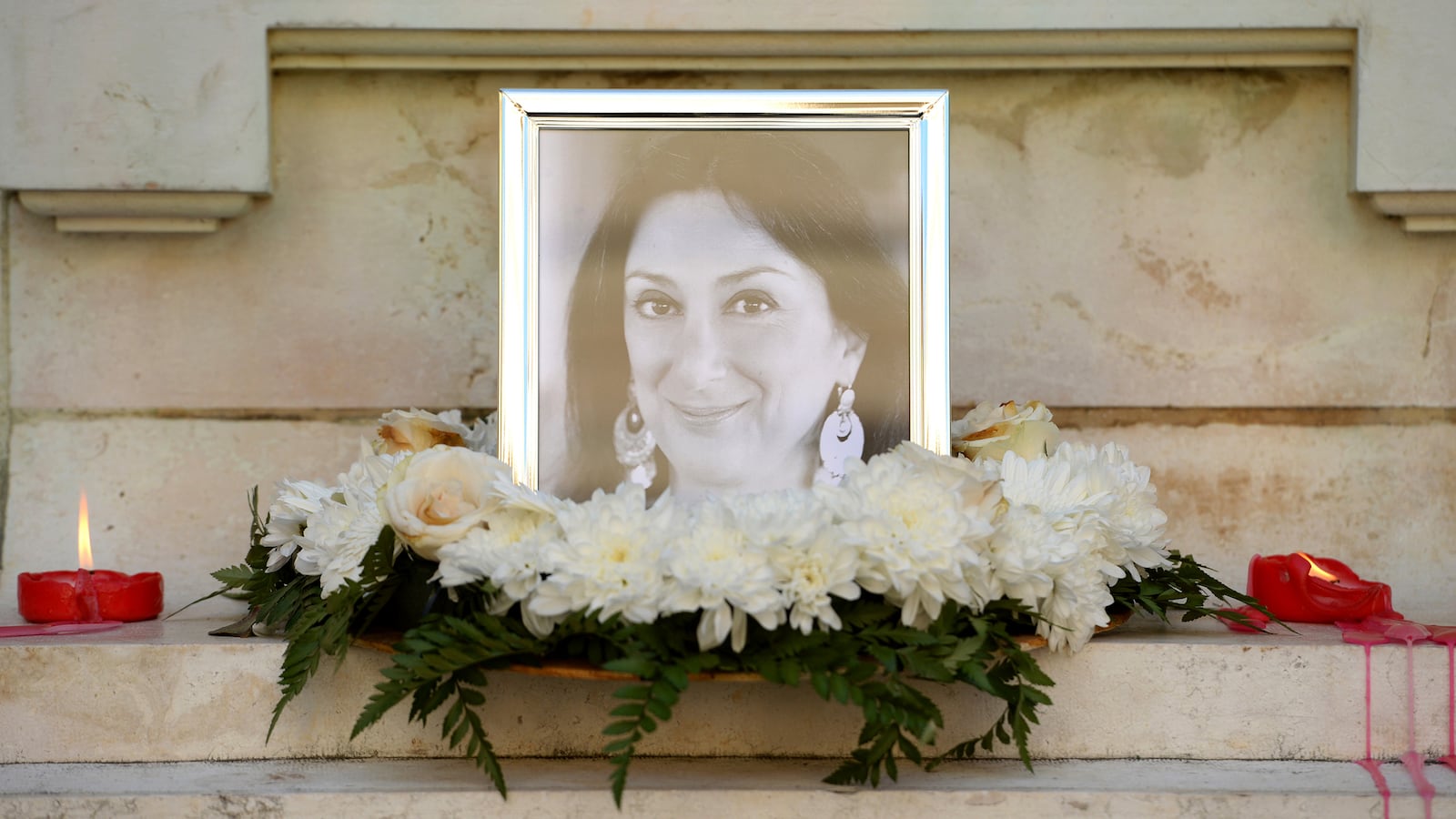CATANIA, Sicily—For the last few weeks of her life, Daphne Caruana Galizia had been renting cars under false names because she knew someone wanted her dead. She drove alone, not wanting to put her husband or sons or anyone else in danger. The precaution didn’t stop the killers, who clearly knew her every move, when they planted two bombs in the Renault 108 rental she had picked up just a day before she was killed.
The first explosion, from under the frame, threw the car high into the air, launching it flaming into a farmer’s field along a country lane near her house. The second, detonated a few seconds later, was placed directly under the driver’s seat to make sure that had she survived the initial bomb, the followup would surely finish her off.
Investigators in Malta told reporters that the bombs were likely detonated by remote control from a nearby hill by someone watching to see that no one else got caught in the explosion. They wanted to make sure there was no mistake that the bomb was intended for her.
The number of people who wanted Caruana Galizia dead is lengthy, making it difficult for investigators to focus on just one person or group. Even the impromptu shrine for her set up in front of the main cathedral in Valletta, Malta, is under police protection and local media report that people are afraid to leave flowers in case they, too, might be at risk.
Investigators are looking at 42 leads that could connect to the killer, based on people who have either said they wanted her dead or had reason to. Many are people she investigated in the Panama Papers case and are alleged to have ties to organized crime and drug- and oil-trafficking rings in Malta and southern Italy.
Police from six different countries have converged on Malta to help investigate the crime. Many are there because of the investigative work she had done and the potential leads she might have uncovered tied to global criminal networks.
Operatives from Scotland Yard are focused on her phones and her laptop computer that was partially destroyed in the blast. The server she used for her popular blog, Running Commentary, had been hacked a number of times, and her son said she kept most of her files with her at all times. If the data can’t be retrieved, some of her work could be lost for good. Investigators also want to be sure that whatever data is found isn’t kept by Malta authorities seen as complicit.
The FBI is focused on the actual bomb, which is thought to be a Semtex military-grade explosive. It’s the same kind that was used to bring down Pan Am 103 over Lockerbie, Scotland in 1988. What’s especially important about that connection is that the plastic explosive is reported to be in great abundance for black-market sales in Libya, a leftover from a cache belonging to former Col. Muammar Gaddafi. Caruana Galizia was investigating a tie between Libyan oil stolen by ISIS operatives and organized crime in Malta and Italy.
The Italian anti-mafia police had already been following up on the journalist’s leads, looking into ties to so-called “dirty oil” that was stolen from Libya and is apparently being sold throughout Europe to help fund ISIS.
On Wednesday, nine people were arrested here and in Malta and Libya on suspicion they are middlemen working between the Sicilian mafia and ISIS operatives in Libya to sell the stolen diesel on the black market.
It is unclear whether the arrests were carried out sooner than anticipated because of Caruana Galizia’s murder. Reporters with several Italian papers had been collaborating with Caruana Galizia and reported Thursday that her murder might have pushed investigators into a corner, making arrests to ensure the suspects they were investigating, thanks to her journalism, didn’t escape.
Catania prosecutor Carmelo Zuccaro (the same prosecutor looking into allegations against nongovernmental charities rescuing migrants) confirmed to The Daily Beast on Thursday his team is looking into diesel that was stolen from the Zawyla refinery west of Tripoli in 2015. Some 82 million kilograms of diesel were illegally imported into Europe by way of Malta and Italy, first on small boats that left alongside migrant boats from the Libya coast and then transferred to larger ships waiting off Malta.
Caruana Galizia had been following this dirty oil trail intently, and is thought to have stumbled upon Maltese businessmen and possibly politicians who might have been involved. But it wasn’t the only money trail the investigative journalist was hunting down and, as such, cannot be assumed to be the one that motivated her assassins. She had also recently alleged a conflict of interest involving businesses Maltese Prime Minister Joseph Muscat and his wife were connected to. Caruana Galizia’s children have called for Muscat’s resignation in the wake of their mother’s death.
In a series of Facebook posts, Matthew Caruana Galizia, himself a journalist, has implied he will follow in his mother’s footsteps uncovering corruption. He announced that he and his brothers were endorsing a fund for a €1 million reward, kicked off by Julian Assange, for anyone who came forward with credible information about their mother’s murder.
“We are not interested in justice without change. We are not interested in a criminal conviction only for the people in government who stood to gain from our mother’s murder to turn around and say that justice has been served,” he wrote. “Justice, beyond criminal liability, will only be served when everything that our mother fought for—political accountability, integrity in public life, and an open and free society—replaces the desperate situation we are in.”






